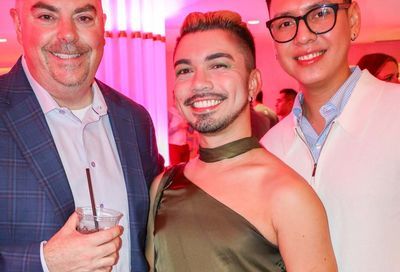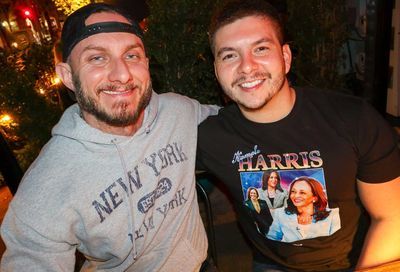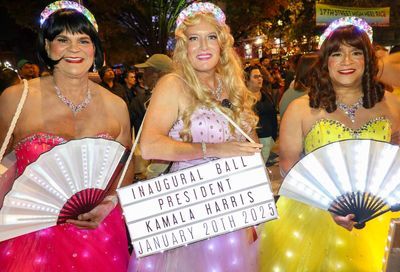A Different World
Lydia Diamond expects us to keep up with the subtleties of her characters, yet she writes like we eat at Appleby's
A funny, provocative and emotionally compelling study of a family rock and what lies under it, Lydia R. Diamond’s Stick Fly is engaging and entertaining theater. But this is, without doubt, what must be described as a “statement” piece, for barely a moment passes without a spoken or silent reference to race, class, gender or the meaning of family. There are therapist-worthy monologues, there are poignant and pointed anecdotes, there are archetypes offered and then busted, myths confirmed and then exploded. Indeed, Diamond has something to say about just about everything in the educated communal consciousness, including the stickfly — a method of entomological research. It would be overwhelming were it not for her equally strong sense of humor, storytelling prowess and an ability to drill her characters down to the point of raw emotional honesty.

Stick Fly
(Photo by Scott Suchman)
The balance Diamond does not get right here, however, is her estimation of her audience. Although she expects us to be capable of keeping up with her fast and furious wit, the clever subtleties and ambiguities drawn into her characters, the complexities in the way in which they relate, she simultaneously writes like we eat at Appleby’s.
Diamond gives us a very wealthy and educated black family gathering for a weekend at their Martha’s Vineyard vacation home — and acts like this is the first we’ve heard of, let alone might know, work with or (gasp) even be friends with someone of this demographic. It is a disservice to an audience which she otherwise seems to greatly respect.
Most of her efforts to “educate” us are grafted onto the character of family patriarch Dr. LeVay, who is called upon to deliver professorial-style anecdotes and references to the point of absurdity. How many overt cues does Diamond think we need to get that this man is educated, wealthy and worldly? Why not gives us a little credit and leave it to the carefully framed and detailed set to give us the necessary socio-economic cues? (And if these flourishes from LeVay are meant to convey his insecurity, it is bungled). Wendell W. Wright does his best with these awkward moments but only when the weekend truly gets underway can we enjoy his wonderfully realized Dr. LeVay in all his unreconstructed anger and loneliness.
Joining their dad for the weekend are his two grown sons, Flip, a plastic surgeon, and the younger Kent, a lawyer turned writer. Both men also bring their love interests: Kent his fiancée Taylor and Flip his current girlfriend Kimber. Neither woman has met Dr. LeVay before and we begin to learn the family dynamic as the boys prepare and lay the groundwork for the introductions. We also meet Cheryl, daughter of the longtime family housekeeper, who has stepped in while her mother is unwell. Tensions rise and events begin to unfold as the younger people meet, interact, and everyone tries to navigate the mercurial Dr. LeVay.
Although Director Kenny Leon could have tightened up some moments here, there is so much talent in this ensemble it is hard to care when the occasional scene falters. In the role of the irrepressible Taylor, Nikkole Salter beautifully captures the anger, angst and bravery of a woman who calls it, unadorned, like she sees it. Taylor is trying to make her point about racism, but there is a vital subtext on sexism here too, which Diamond could have continued to explore.
Taylor’s fiancé Kent is played by Jason Dirden and although Kent eschews the polish of his station in life, Dirden doesn’t quite convince that it is nevertheless there – if distained. But Dirden’s low-key expressiveness overcomes this problem and he delivers a very believable, nuanced man. It is not easy to set a character up as the “good” guy without creating something wooden — but Diamond writes him with humor and subtlety and Dirden pulls it off. The elder more established Flip is played with brittle accuracy by Billy Eugene Jones with eyes that speak volumes. He does much with this rarified, demanding man, but Diamond fails to write him with consistency. There’s much more to show about a man who binds up blindly to his father and his father’s mores; the insecurity, the fragility, the certainty.



To Feb. 7
Arena Stage
Crystal City
$47-$74
202-488-3300
arenastage.org
As Kimber, Rosie Benton is fully engaged if occasionally forced. An excellent foil, Kimber comes with a detailed narrative and enough verve to be enjoyably mocked, but she is never truly explored. She makes a strange match with Flip and indeed their scenes of sensual affection show little chemistry. There is, of course, plenty of chat about why Flip is with a white woman, but a more burning question is why this particular white woman?
Orbiting ever closer to the foursome is Cheryl, the cheerful but savvy housekeeper played with innate veracity by the excellent Amber Iman. Although Cheryl is a familiar in-your-face character and Iman draws maximum humor with her superb comic timing, the actress gives this young woman a memorable genuineness and dimension. Iman also manages to deliver the single most moving and emotionally raw moments of the play. These are also the times when Diamond finally transcends demographics and gives us her glorious insight into people and what we all want.
Support Metro Weekly’s Journalism
These are challenging times for news organizations. And yet it’s crucial we stay active and provide vital resources and information to both our local readers and the world. So won’t you please take a moment and consider supporting Metro Weekly with a membership? For as little as $5 a month, you can help ensure Metro Weekly magazine and MetroWeekly.com remain free, viable resources as we provide the best, most diverse, culturally-resonant LGBTQ coverage in both the D.C. region and around the world. Memberships come with exclusive perks and discounts, your own personal digital delivery of each week’s magazine (and an archive), access to our Member's Lounge when it launches this fall, and exclusive members-only items like Metro Weekly Membership Mugs and Tote Bags! Check out all our membership levels here and please join us today!



















